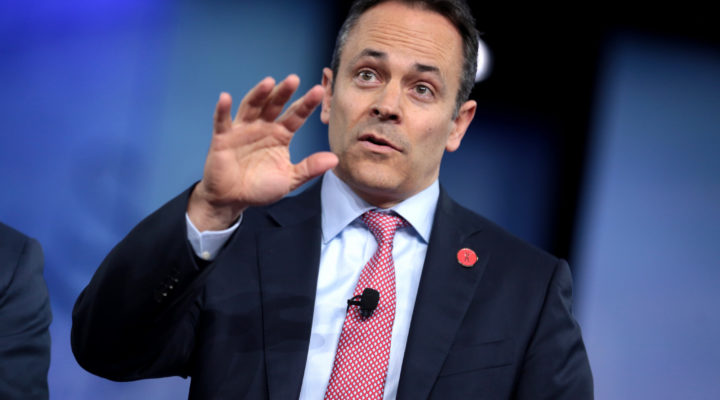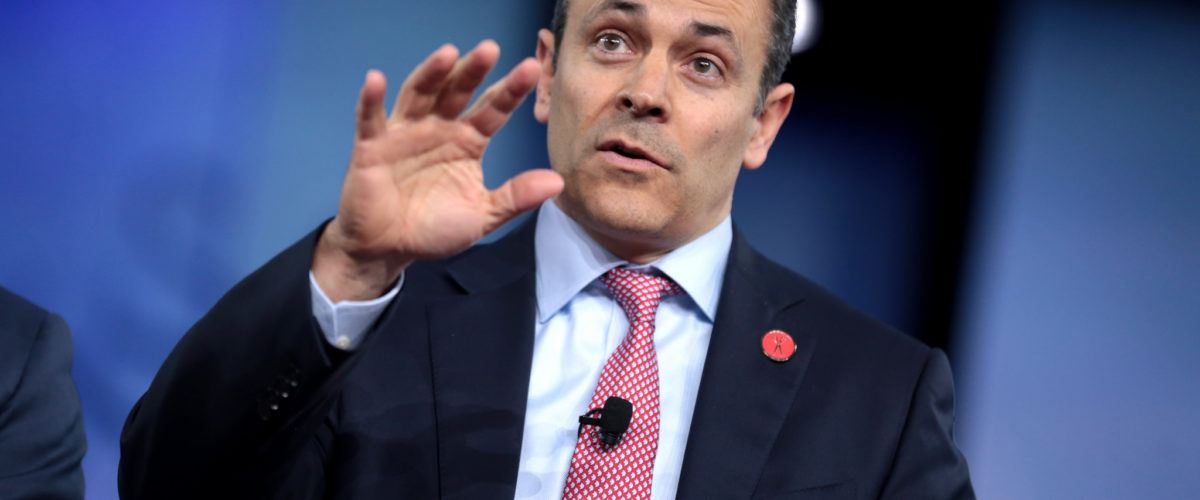A call by Kentucky’s governor to pray away gun violence in predominantly African-American West Louisville fell on deaf ears of clergy hoping for more tangible solutions to more than 50 homicides in the Commonwealth’s largest city so far in 2017.
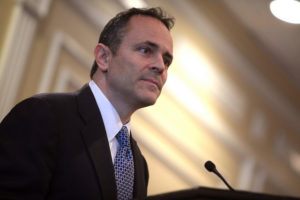
Gov., Matt Bevin
Gov. Matt Bevin, an evangelical Christian and financial supporter of Southern Baptist Theological Seminary in Louisville, urged residents to commit to walk in small groups of three to 10 people through high-crime neighborhoods, pausing to pray at each corner and chat with people they meet two or three times a week for the next year.
“The lieutenant governor and myself laid forth a very simple request to people,” Bevin said in a press conference after unveiling the plan in a meeting attended by about 400 residents June 1. “It is harnessing people of faith to pray for the community, engage with the community by physically walking blocks in that community, praying for the community, for the people in those communities, and engaging with them.”
Bevin’s plan is similar to a practice in evangelical circles called “prayer walking,” a type of intercessory prayer that involves walking to or near a particular place while praying. It’s a fairly recent phenomenon with unclear origins, though some have suggested it may be inspired by the Old Testament account of Joshua’s army marching around Jericho for seven days before a trumpet blast and shout brought the city wall tumbling down.
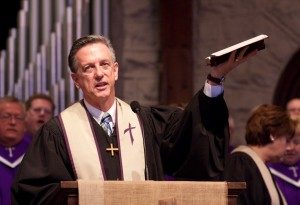
Joe Phelps
Joe Phelps, pastor of Highland Baptist Church in Louisville, which during Advent places crosses on its front lawn representing each person in the city killed that year, said the governor has no plan for addressing urban violence and termed the meeting “just a political ploy.”
“If that’s the best the governor has to offer, he needs to go back to Frankfort,” Phelps told ABC affiliated WHAS 11 News.
“Instead of Bud Light, we got Church Light today,” Phelps said. “This is not what Christianity represents. To tell people to go pray for those who are poor and destitute and desperate only without saying bring resources, individual and governmental resources, is a farce.”
Phelps is a leader in Empower West Louisville, a coalition of black and white churches and groups including the Cooperative Baptist Fellowship of Kentucky promoting economic development in poor neighborhoods.
Simmons College President Kevin Cosby, president of Simmons College and the driving force behind Empower West Louisville, criticized the governor’s proposal on social media.
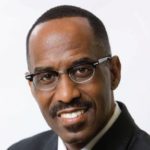 “Gov. Bevin’s press conference today did more to divide blacks and whites in Louisville than any single event in recent years,” Cosby, pastor of St. Stephen Church in West Louisville, posted on Twitter.
“Gov. Bevin’s press conference today did more to divide blacks and whites in Louisville than any single event in recent years,” Cosby, pastor of St. Stephen Church in West Louisville, posted on Twitter.
Bevin said some people who attended thinking the meeting would include “one agenda or another” were disappointed, but the prayer patrols are “a single component of many, many things that need to be done.”
“I personally believe in the power of prayer,” Bevin said. “I have seen it evidenced not only in our communities but beyond, and this is what we are asking people to do.”
“Do we still need political solutions and law enforcement solutions?” he asked. “Do we still need economic solutions? You bet we do. Of course we do. This isn’t in any way, shape or form trying to take the place of other things that have got to be done, but this is something that we firmly believe will make a difference in our community.”
Jason Crosby, pastor of Crescent Hill Baptist Church in Louisville, said people on both sides of the line that divides the city in terms of racial makeup and economic disparity geographically between east and west, would benefit from seeing how the other half lives.
“The plan to descend upon four ZIP codes and to walk blocks for a year and pray on street corners does have some merit,” said Crosby, another leader in Empower Louisville. “However, I think a similar plan operating in reverse would address the problem that is violence in our community more effectively.”
“I think rather than having folks from other parts of Louisville descend on the Russell neighborhood, for instance, I think we need to get people from the Russell neighborhood to ZIP codes in East Louisville and let them walk the streets and see what life is like for people in other parts of our community, and begin to have access to some of the resources that are made available more readily and easily to people who live in those corners and pockets of our community,” Crosby said.
Phelps said as a pastor, he, too, believes in prayer. “I pray every day,” he said. “I pray all the time, but that’s not the answer here. For him to reduce the problems of violence to getting people to go pray for a block is an embarrassment to Christianity.”
Previous stories:
Ky. church, in Advent tradition, remembers homicide victims
KBF, historically black college, join forces to fight poverty
Black pastor urges CBF to partner with institutions in the ‘hood’

